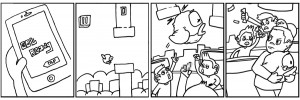Flappy Bird app’s fall a silver lining for society
After weeks of soaring, the notorious Flappy Bird has been grounded at last.
This past weekend, the smash hit game was taken down from app stores after game designer Dong Nguyen tweeted, “I cannot take this anymore.” What exactly could Nguyen not take anymore? From a cursory glance at his Twitter account, it was the overwhelming slew of criticism and vile online harassment that rained negativity on his success. Despite its short life, the app holds many lessons on the new height of danger for games that blow up in both financial and emotional value and, more importantly, the virtue in staying true to the self, as Nguyen did.
In this day and age, when free game apps bring in millions, Nguyen’s decision reflects the increasingly apparent negative consequences of obsessions with games such as Candy Crush and Angry Birds. That the simple act of removing a popular game could create such hype is telling of the importance such games have in society today.
Flappy Bird covered considerable ground this winter, rising from humble beginnings last May. Though it only took a few nights for Nguyen to code the game, he told The Verge that he was raking in $50,000 of profit a day. The appeal of such games is inversely proportional to complexity. The addiction comes from the fact that the game is easy to learn, yet difficult to master.
Nguyen said the original intention of the game was to relax and entertain. Yet because of the obsession and the emotional value invested into it, the game lost its purpose, edging players into dangerous territory.
People can waste days without reaching double digits. Weeks can go by before passing 25 pipes without making Flappy beak-plant. The phenomenon of “Flappy Bird rage” has flown in, along with complaints by App Store reviewers on how the game “robbed them of their productivity, their sanity, and ultimately their soul,” Will Oremus wrote on Slate.
Yes, Flappy Bird has reminded us of the dark side of humans, but there’s also a silver lining to its story — its end as an act of virtue on Nguyen’s part.
Some theorists say that Nguyen’s decision was a strategic move, that he sensed that Flappy Bird would be a fad and that in its removal, mystique would build and create more demand. Yet he doesn’t seem to be the marketing mastermind they’re making him out to be.
Based on Nguyen’s Twitter, the game brought not only fame, but also heaps of envy and spite that he couldn’t quite handle. To a student asking to interview him for an entrepreneurial project, Nguyen denied being an entrepreneur, and to a suggestion to hire a public relations representative, he replied, “I won’t. The PR will make me not an indie game maker anymore.”
The innocence of his earlier tweets — “Wow, my game got in the top 10 U.S. free apps. Thank you, people” — contrasts the despair that seeps through one post on Saturday, reading, “I can call ‘Flappy Bird’ a success of mine. But it also ruins my simple life. So now I hate it.”
In the end, to stay true to his values — and to a life of simplicity as a “passionate indie game maker,” as his Twitter account proclaims — Nguyen pulled the plug. After all, everyone knows that when a game becomes more than a game — for the creator and the user alike — the fun ends and the crazy begins.
Valerie Yu is a sophomore majoring in biological sciences and English. “Point/Counterpoint” runs Fridays.


